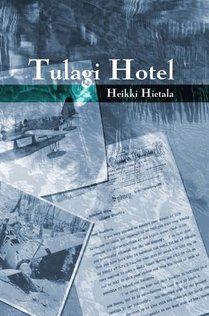
However, having become accustomed to a more modern style of writing - the "hook 'em quick and keep 'em turning pages!" school of thought - Tulagi Hotel may take some mental readjusting to be properly enjoyed.
And I mean that in a good way.
The story moves at its own pace, never rushes and yet, never quite dallies. The timeline jumps about a bit, going from post‐war to wartime to pre‐war settings almost at random. But it works, and that can take the reader by surprise if they weren't expecting such transitions.
Something else which might prove troubling for modern readers is that there are occasional switches in POV, from the main character, Jack Maguire, to those of the people he is dealing with in a given scene. It's arguable that this is an intentional echo of the overall structure of the novel - it's jarring at first, but once one has read such asides a time or two, it becomes less so.
My only argument in this respect is that I would have liked to linger in those alternate points of view a little longer. For example, I would liked to have heard more about Don or Kay Wheeler's thoughts or experiences once I'd seen their takes on a scene. I came away with a slight sense of frustration afterwards, after having been given a glimpse into another perspective which only lasted for a paragraph or a page more.
Still, as a fan of stories involving World War Two aviation - planes and pilots have long been sources of fascination for me - there was much in Tulagi Hotel to hold my interest. Hietala's descriptions of aerial combat and the psychology of the pilots who fly inherently dangerous missions are both well‐researched and well‐written. I've known several pilots in my life, and Hietala captures their sometimes morbid and emotional mix of fatalism and irreverence well.
There is an acceptance of the supernatural as a commonplace element in life, which I found most intriguing. Hietala writes this in a very matter‐of‐fact way, acknowledging that not everyone would accept it, but that for many of the characters it's simply a part of their lives.
I was truly impressed with how Hietala handles the emotional twists and turns his characters are dealt. The loss of loved ones is expected in a war story, but there are some truly heartwrenching farewells which brought tears to my eyes more than once. Balancing such scenes out are moments of humor and delight. There are some genuinely funny moments in Tulagi Hotel, written in a realistic and sometimes endearing fashion.
The overall tone of the book harkens back to a simpler time and a simpler style of writing. At times, it genuinely feels like a story written in the era in which it takes place. I think this is remarkable and that it shows just how much research Hietala did, as well as just how ably he absorbed that knowledge and put it to work for him.
Aside from the POV shifts I mentioned before, the only other problem I perceived was that the dialogue sometimes seemed a little stiff, or formal - particularly in the scenes set in the rural Midwest. However, this is really a minor quibble and a very forgivable oversight.
If you're the kind of reader who would like a return to a kinder, more old‐fashioned style of storytelling, Tulagi Hotel is a book you should pick up as soon as possible.
 RSS Feed
RSS Feed
